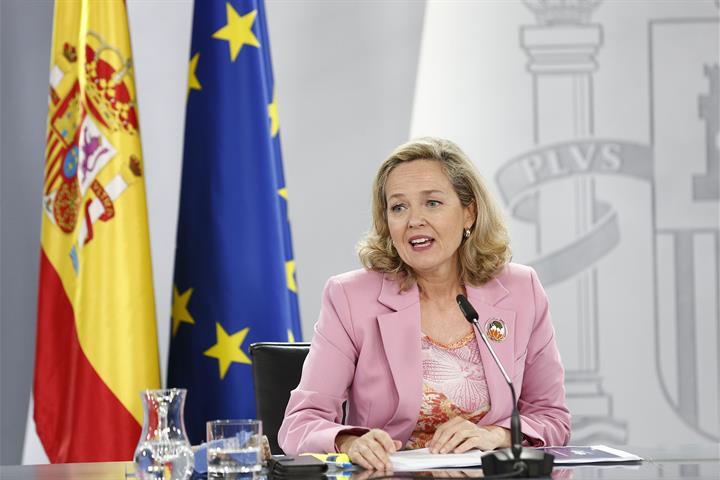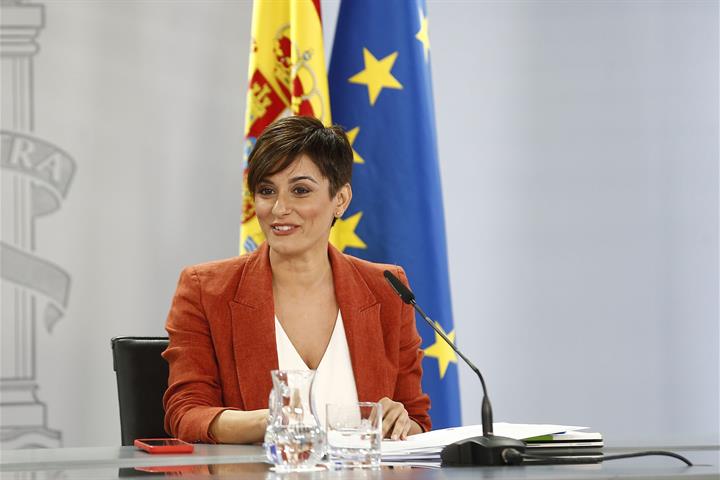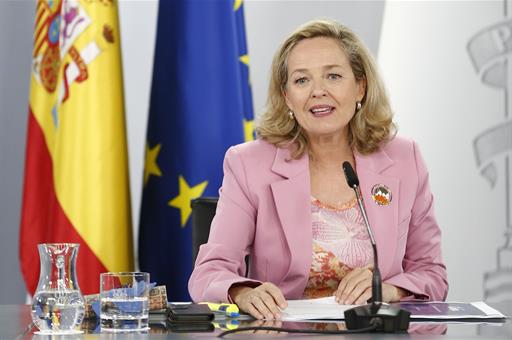Council of Ministers
The Government of Spain approves aid for those affected by the September hurricanes in nine communities
Council of Ministers - 2023.9.25
Moncloa Palace, Madrid
The Council of Ministers has agreed to declare an area seriously affected by a Civil Protection emergency 28 counties damaged in September by various adverse weather events and forest fires. They belong to the communities of Andalusia, Aragon, Castile and Leon, Castile-La Mancha, Catalonia, Valencia, the Balearic Islands, the Community of Madrid and the Region of Murcia.
Among these meteorological episodes, the Minister for Territorial Policy and acting Government Spokesperson, Isabel Rodríguez, highlighted the isolated depression at high levels (DANA) that occurred on 2 September causing the death of eight people and a great deal of material damage.
Rodriguez pointed out that those affected by the emergencies will be able to apply for the aid provided to alleviate personal injury and material damage to homes and belongings, industrial establishments, businesses and other services. The declaration adopted today also includes assistance to local authorities whose territories have been affected by the rains to help them to bring normality to their municipal areas as soon as possible.
The spokeswoman recalled that during the legislature, the government has completed the actions entrusted to the regional governments in this area in the exercise of their powers: "It is a matter of activating all available mechanisms on the part of the state in partnership with the communities. The government has acted speedily and effectively, reducing response times to this type of event, and has reaffirmed its commitment to also speed up the processing of aid and to accompany the affected communities and municipalities, she concluded.
Strength of the Spanish economy
First Vice-President and Acting Minister for the Economy and Digital Transformation Nadia Calviño has presented to the Council of Ministers a report on the situation of the Spanish economy. Calviño stated that in a complex international context marked by uncertainty and dizzying changes, "the Spanish economy is demonstrating its strength more than ever", as evidenced by the fact that it is currently the fastest growing large economy in the EU and the one with the lowest inflation.
The vice-president stressed that the definitive GDP figures confirm what was anticipated by the other activity indicators: the economy has recovered strongly since 2021, surpassing the pre-pandemic GDP level in the summer of 2022 -in other words, in just two years- and is currently 2% above that level.
The strong activity of the Spanish economy, Nadia Calviño assured, will continue in 2023, with the main national and international organisations revising their growth forecasts for Spain upwards, placing them above those of the executive, at around 2.3% for the year as a whole.
Specifically, in the first half of the year, Spain has led growth in the EU, which is well above the main economies in the region. The vice-president attributed this differential growth mainly to four factors: the rapid deployment of the Recovery, Transformation and Resilience Plan; the dynamism of the labour market; the positive evolution of the foreign sector; and the solvency of companies and families.
Investment, consumption and employment growth
Nadia Calviño pointed out that investment has risen by 5% since the Recovery Plan was launched, compared to an average of 1.6% in the euro area. Consumption is also growing by more than 2% year-on-year, above the euro area average, "which confirms the effectiveness of the measures taken to sustain the real income level of households, especially the most vulnerable".
The vice-president also described as "extraordinary" the rate of job creation in the first half of the year, with a record 21 million people in employment. In fact, in that period, 60% of job creation in the EU took place in Spain. These figures are accompanied by greater stability and quality of jobs, largely thanks to the labour reform, in "contrast to the twelve years it took to recover the level of employment prior to the bursting of the real estate bubble" and "to the increase in precariousness that also occurred in that lost decade".
Structural change
 The First Vice-President and Acting Minister for the Economy and Digital Transformation, Nadia Calviño, during her speech at the press conference after the Council of Ministers | Pool Moncloa/César P. Sendra
The First Vice-President and Acting Minister for the Economy and Digital Transformation, Nadia Calviño, during her speech at the press conference after the Council of Ministers | Pool Moncloa/César P. Sendra
Employment has grown particularly in higher value-added services, such as Information and Communication Technologies, R&D&I and science.
The Minister for Economy and Digital Transformation indicated that this structural change is also reflected in the foreign sector: Spanish companies are gaining competitiveness and market share thanks to low energy prices and the boost to digitalisation and engineering, consulting, technology and scientific activities, which is driving exports of non-tourist services.
As a result, the Spanish economy's external debt position has fallen by 30 points since 2020. There has also been a significant reduction in the indebtedness of companies and households, "which explains the resilience of the Spanish economy vis-à-vis rising interest rates and strengthens domestic demand even in such an uncertain international scenario", said Calviño.
Improvement in deficit, debt and inflation
The first vice-president noted that the improvement in the private sector has been made possible by strong public sector support, first in response to the pandemic and then to the impact of the war in Ukraine.
The government's "responsible" fiscal policy, she added, is making it possible to take advantage of the strong growth to reduce the debt and the public deficit in relation to GDP as quickly as possible. The public debt-to-GDP ratio has fallen by more than 5 points in one year and closed 2022 almost 4 points below the target set in the Stability Plan. As for the public deficit, it has fallen by more than 5 points in 2 years, which means that the fiscal targets have been "comfortably" met, making it easier to bring forward the reduction of the deficit to 3% to 2024.
It also places Spain "in a very good position" to lead the negotiations on the review of the EU's fiscal rules, one of the priorities of the Spanish Presidency of the Council of the EU. "We need fiscal rules that guarantee fiscal and financial sustainability in a way that is compatible with the investment needed to boost economic growth and job creation, and to tackle the double green and digital transition," said Calviño.
The report on the Spanish economy also highlights that Spain is one of the countries with the lowest inflation. In August, the harmonised CPI rose by 2.4% year-on-year, less than half the EU average.
Progress made with the recovery plan
Regarding the Recovery Plan, the Minister for Economy emphasised that Spain is leading the deployment of the 'NextGenerationEU' funds: it has received EU transfers worth €37 billion thanks to the fulfilment of milestones and objectives and will soon request a fourth payment of €10 billion. A total of 80% of these funds have already been awarded through calls for grants and tenders for works and services, and almost 60% of the 500,000 projects under way are being led by companies and research centres.
"We are at the halfway point of the Recovery Plan, but we have practically completed the reform programme. We are already at cruising speed in the execution of investments and, thanks to the strong concentration of investments and reforms in the period 2021-2023, we have achieved the first objective: a strong recovery of the Spanish economy", said Calviño. In the coming weeks, the government expects to receive the approval of the European Commission for the addendum to the Plan and thereby launch the second phase, for the period 2023-2026.
In short, the international slowdown is affecting the Spanish economy, but "Spain is in a good position and with a positive outlook for the coming months", said Calviño, who advocated continuing to work "without complacency" and "with determination and confidence" to support the families and companies most affected by the rise in prices and interest rates, and to deploy "a balanced and responsible economic policy that works and responds to the general interest".
Call for elections in municipalities without candidates
 The Government Spokesperson and acting Minister for Territorial Policy, Isabel Rodríguez, during her speech at the press conference after the Council of Ministers | Pool Moncloa/César P. Sendra
The Government Spokesperson and acting Minister for Territorial Policy, Isabel Rodríguez, during her speech at the press conference after the Council of Ministers | Pool Moncloa/César P. Sendra
The executive has called elections in the 44 municipalities in which no candidates stood in the local elections on 28 May. The elections will also be repeated in nine polling stations where irregularities were detected that led to the annulment of their results by final judgement or by agreement of the competent Electoral Board.
Isabel Rodríguez reported that the Organic Law on the General Electoral System provides for by-elections to be held within six months in these cases. The elections will be re-held on 26 November.
The spokeswoman pointed out that these elections will also include a 15-day election campaign, which will begin at 9am on Friday, 10 November and end at midnight on Friday, 24 November.
Investments
In the area of investments, the spokesperson of the executive informed of the authorisation to put out to tender a contract for the maintenance and operation of 160km of state roads in the province of Segovia for €29 million.
Likewise, the Council of Ministers has agreed to allocate €20 million to improve the protection of the railway platform on the high-speed lines of the Northern Axis, in the Madrid-Valladolid-Palencia-León and Olmedo-Ourense sections.
Non official translation





